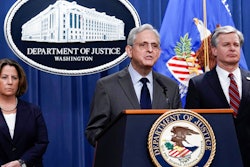The United States said Monday that the World Trade Organization is losing its focus on trade negotiation and "becoming a litigation-centered organization."
U.S. Trade Representative Robert Lighthizer also complained that some WTO members try to gain concessions through lawsuits that he said they could never get at the negotiating table.
"We have to ask ourselves whether this is good for the institution and whether the current litigation structure makes sense," Lighthizer said at the WTO's ministerial meeting that is being held in Argentina.
Without naming names, he also said some member countries use their status as developing nations to obtain concessions and don't follow WTO rules.
"We need to clarify our understanding of development within the WTO," he said. "We cannot sustain a situation in which new rules can only apply to the few, and that others will be given a pass in the name of self-proclaimed development status."
President Donald Trump has said the policy of the U.S. "is to aggressively promote and use American-made goods."
Some member nations that favor free trade have decried what they say are Trump's protectionist measures. But many also acknowledge the 164-nation WTO needs reform.
"We believe that it's not sustainable to advance in a scheme where one is always the protectionist and the other one (is) the one who always breaks the rules," Argentine President Mauricio Macri said Sunday during the event's launch.
"The problems of the WTO will be resolved with more WTO, not less WTO."
Earlier this year, 10 WTO members, including the European Union, Canada and Japan, urged Washington to continue honoring the trade body's "Government Procurement Agreement" that binds the U.S. and 45 other countries — mostly EU members — to open government procurement markets to foreign competition and make them more transparent.
This week's meeting in Buenos Aires will also address issues including food and agriculture, e-commerce, fisheries, and development.
A network of worldwide civil society organizations says about 60 of its experts who were planning to attend had their credentials revoked by Argentina's government.





















